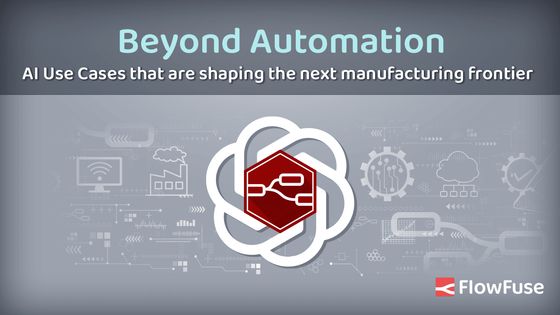Beyond Automation - AI Use Cases that are shaping the next manufacturing frontier
In which AI-powered capabilities should one invest to bring about transformative changes in the manufacturing environment?

Are we standing on the brink of a Fifth Industrial Revolution? The manufacturing industry has been in a state of flux for some time, with the rise of automation and digital transforming the way factories operate. But today, we are witnessing something even more profound: AI is pushing manufacturing to a whole new level. Some have even referred to it as “the fifth industrial revolution” due to its potential for disruption.
But the question lingers for many plant managers and decision makers: in which AI-powered capabilities should one invest to bring about transformative changes in the manufacturing environment?
As we navigate this question, I want to focus on three AI uses that are not only ripe for investment but also pivotal in driving manufacturing success in this competitive market.
Empowering Citizen Developer Strategy with AI
The concept of citizen development stands as one of the most significant fields in my opinion, a sentiment I've detailed in my previous article about Citizen Developers. This approach is revolutionizing the manner in which applications are crafted and deployed across various industries. By empowering individuals—irrespective of their coding knowledge—to create applications, AI is dramatically hastening this process.
Investing in AI capabilities that bolster your citizen developer strategy can fast-track application development, offering intuitive, template-driven platforms that employ AI to navigate users through the creation process. As we've seen over recent months and years, AI can significantly assist in code generation, thereby granting your citizen developers an even smoother initiation into application development.
An excellent instance of this is the article and Node-RED Node describing the potential for integrating Node-RED with ChatGPT to assist you in building applications. This integration highlights the practical, user-friendly solutions made possible through AI, making the realm of app development accessible to a broader range of innovators.
Refining Warehouse Management through AI-Driven Demand Forecasting
In an era marked by complexities in supply chains and customer demand, AI's role in warehouse management becomes a game-changer. AI algorithms analyze historical data and market trends to predict future demand with astonishing accuracy, a step beyond traditional forecasting methods.
For decision makers, investing in AI for demand forecasting means significantly minimizing overproduction or stock outs, optimizing inventory levels, and improving customer satisfaction. The advanced analytics offered by AI not only predict what products are in demand but also when and where they are needed, thereby facilitating strategic planning and resource allocation.
Elevating Predictive Maintenance and Quality Control
Unplanned downtime and quality inconsistencies are two of the biggest profit drains in manufacturing. AI's predictive capabilities are setting new standards in both maintenance and quality control protocols. By continuously monitoring equipment performance and production processes, AI can predict and identify machinery failures before they occur and detect quality deviations in real-time—allowing for immediate correction. Investing here means less downtime, reduced maintenance costs, improved product quality, and ultimately, an enhanced bottom line.
Your Digital Infrastructure & Architecture is key
While understanding where concrete Use Cases are is crucial, it’s equally important to ensure that your digital strategy and architecture can support and quickly adapt to these advanced AI implementations. See also my article about the Unified Namespace. A flexible system that integrates a Unified Namespace is critical for seamless data exchange across various systems and applications. Moreover, fostering a citizen developer environment is fundamental in ensuring that these AI investments are maximally utilized, empowering your workforce to contribute actively to the company's innovation cycle.
Related Articles:
- Beyond Cloud AI Orchestration: Why the Future is Hybrid Edge-Cloud Intelligence
- Evolution of Technology: Impact on Job Roles and Companies
- FlowFuse 2.6: AI Infused Node-RED, Persistent File Storage & Lots More
- AI and ChatGPT - Revolutionizing the Manufacturing Industry
- Modbus TCP vs Modbus RTU: Reliability, Latency, and Failure Modes